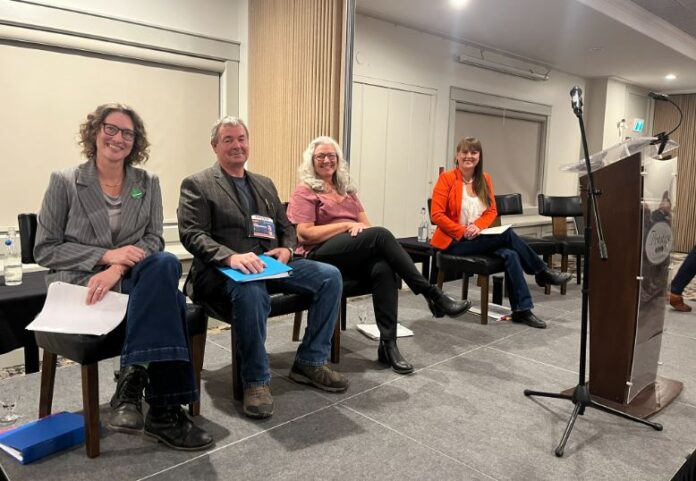All four Kootenay-Central candidates were in attendance with the forum focusing on the needs of local small businesses.
Candidates were asked a total of eight questions, one of which focused on supporting local industries, while another addressed homelessness, mental health, and addictions.
Small businesses and local sectors
The first question asked what the candidates would do if elected to alleviate some of the pressures on small businesses in the food and beverage, retail, construction, and development sectors that are struggling to keep up with costs in a financially meaningful and trackable way.
For NDP incumbent Brittny Anderson, the solution involves removing red tape and continuing her government’s efforts to support small businesses.
“In our platform, you can see that we’re cutting red tape, particularly for places like wineries, breweries, and distilleries. We’re investing in organizations like Kalesnikoff, funding their facility expansion so they can do more with the wood and create even higher value added to it. We’re also supporting the Harrop Proctor sawmill through the rural economic development program. We’ve taken some good initial steps, and we will continue to smartly support small businesses.”
BC Conservative candidate Kelly Vandenberghe agreed with Anderson’s statement about cutting red tape, saying that the sectors are “being destroyed” by red tape and bureaucracy, which he vows to address.
“Thank you for using the conservative term ‘red tape.’ That is exactly what we want to do—get rid of the bureaucracy. And of course, we won’t wait seven years to get it going; we’ll start right away. We’re dedicated to reducing the small business tax to one percent, cracking down on crime, cutting the carbon tax, and eliminating the NDP home builder tax. Those are the things we will focus on.”
Nicole Charlwood of the BC Greens says her party wants to conduct a systemic review of BC’s entire tax and transfer system to create a fair and straightforward system that would simplify filing and provide transparency regarding who benefits from tax breaks, in addition to developing a universal income.
“Beyond taxing extreme wealth, we aim to establish a fair and easy system that simplifies filing. This will involve not just examining what is taxed and what isn’t, but also to what extent and who benefits from tax breaks—it’s definitely not small and local businesses.
We want to flip that around. I’ve also heard repeatedly that businesses struggle to pay a fair wage to their staff, and I fully support a guaranteed livable income, which has the full backing of my party. This will reduce the stress and burden on small businesses, ensuring people can take care of themselves.”
Corrine Mori, independent candidate, blames the carbon tax for the current pressures on small businesses, in addition to rising minimum wages.
“The carbon tax is killing small businesses. They can’t afford it, and we can’t afford to have those small businesses go out of business. Small business owners have also stated that the minimum wage needs to be graduated. There is no incentive to hire a 12-year-old when you have to pay them the same as a single mom of two. So, we need to change how the minimum wage is distributed.”
Her solution, if elected, involves starting education programs for in-demand sectors to help with staffing shortages, such as a student co-op program.
Homelessness, housing, mental health, and addictions
When asked what policies and strategies each candidate supports to address homelessness in our rural region, considering the unique challenges the riding faces, Vandenberghe said the issue is complex.
He noted that a conservative platform will examine the root causes of homelessness in the region and offer solutions that involve drugs and recovery.
“First of all, we need to eliminate drugs. Our platform supports a program of prevention, harm reduction, dignified treatment and recovery, and intervention. This means ending decriminalization, stopping drug legalization, and addressing addiction before it occurs.
We must ensure that every consumption site has a meaningful gateway to treatment, cut wait times for voluntary treatment, and allow parents to work with their children to get them help if they feel it’s necessary. Mental illness is also intertwined with this issue.”
Anderson responded to Vandenberghe’s comment about eliminating drugs, saying she would “love it if the toxic drug supply was just over,” but acknowledged that it’s a complex challenge that her government will continue to address.
“It is an incredible challenge that we are facing. What we’ve been doing is opening more places for people to receive treatment, ensuring that there are seamless supports from detox, to treatment, to recovery, and then into complex care housing.”
Mori echoed Vandenberghe’s comments about decriminalization and safe supply, stating that both have placed excessive pressure on the housing system.
“We have created many individuals with significant addiction issues who now need society’s support to care for themselves. This increased pressure makes it very difficult to provide the housing needed for others. We must address the root of the problem first, allowing people to lead fulfilling lives without struggling with addiction, and then create supports for that, including finding ways to provide rent-to-own options.”
Meanwhile, Charlwood stated that the Greens want to focus on non-market solutions for homelessness.
She says this would result in more co-ops, affordable housing, care housing for those with addictions and other concerns, more rental housing, and funding for renter supports, with a commitment of 26,000 non-market housing units annually for several years.
“We want to support renters by controlling rent increases and establishing standards for evictions. We also aim to assist local builders in acquiring the trained staff they need.”
Other topics discussed included climate change, forestry, education and childcare, and economic prosperity.
The election will be held on October 19.
Be the first to know! Don’t miss out on breaking news and daily updates in your area. Sign up to MyNelsonNow News Alerts.





